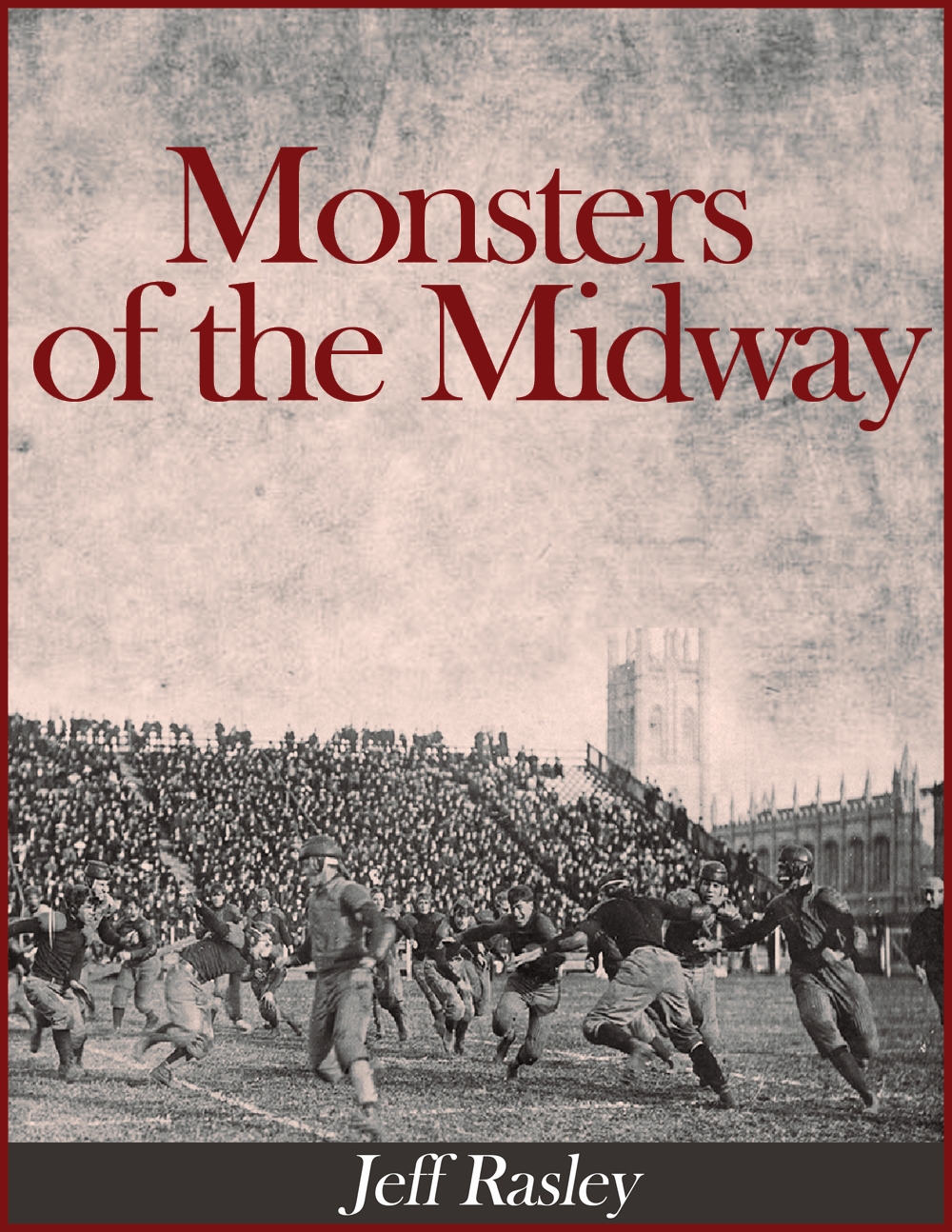Today we have a sneak peek from author Jeff Rasley’s historical sports fiction book MONSTERS OF THE MIDWAY: The Worst Team in College Football?:
 Was this ragtag band of precocious intellectuals the worst, or the most courageous, team in college football? From 1892 until the 1930s the legendary Monsters of the Midway dominated college football. However, in 1939 the University of Chicago dropped out of the Big Ten and killed its varsity football program.
Was this ragtag band of precocious intellectuals the worst, or the most courageous, team in college football? From 1892 until the 1930s the legendary Monsters of the Midway dominated college football. However, in 1939 the University of Chicago dropped out of the Big Ten and killed its varsity football program.
But now, it’s 1969 and football is back. The resurrection of Chicago football hasn’t brought the Monsters back to life. The team plays more like the lab mice of the Midway. The new Maroons are called “the worst team in college ball” by People Magazine. But this under-sized and outnumbered team is also compared to the hero of Troy courageously facing Achilles. They lose game after game. Yet, guys whose IQ is greater than their weight refuse to give up their mission to win one for their old coach, Wally Hass. Wally’s goal is to win one more game before he retires which would make his 100th victory as a coach.
MONSTERS OF THE MIDWAY: The Worst Team in College Football? is available at Amazon.com
And now, from MONSTERS OF THE MIDWAY: The Worst Team in College Football?:
Jack turned in his pads and practice uniform after the last of the two weeks of preseason double practices his junior year in high school. He had decided to quit the third day of doubles. He waited to inform the coach until the two weeks of grueling daily double practices were at an end. He didn’t want to be accused by the coach or his teammates of quitting because he wasn’t tough enough to handle the four hours of football drills in the humidity of Southern Indiana during August. A deficiency of toughness would have been an inaccurate interpretation of Jack’s motives for quitting the team.
One reason Jack quit the sport was a cost-benefit analysis. The cost of giving up every autumn to football was not worth the benefit. He was already a three-sport letterman for the Owls in football, swimming and track. In what little spare time he had, Jack loved to hike the hills and fish the streams of the backwoods around his home in Jackson County, Indiana. Solitude with Nature touched his soul in a way that playing football did not.
Jack did love playing sports and he very much enjoyed being part of a team. He recognized that his loner tendency needed to be tempered with social activities. In small-town Indiana being on the school football team was one of the few social outlets offered. But, while he liked playing football and being on a team with his high school buddies, he considered most of the time spent in practice an utter waste of time. It was not playing football. In swimming, the team swam. During track season, the runners ran. Preseason football practice, on the other hand, was spent doing boring and, in Jack’s mind, needlessly painful drills. Bear crawls, push-ups, barrel rolls, neck bridges, jumping jacks, etc. ad infinitum consumed large chunks of practice time.
Another reason Jack quit football was a result of serious self and social re-examination. He was sixteen, well read and thoughtful. In the mid Sixties the country was beginning to turn against the war in Viet Nam. The civil rights movement was gaining momentum with increasing and escalating acts of civil disobedience. The United States was divided and people were starting to choose sides: For or against equal rights for minorities; for or against the War; for Elvis or the Beatles? Jack was beginning to feel ready to choose which side he wanted to be on. Continuing to play football seemed sort of contrary to the side he was drawn to. Counter-culture voices Jack had tuned into, like Timothy Leary, Allen Ginsberg and Bob Dylan, had turned him on to a different point of view from the small town Midwestern traditional values he’d grown up with. Jack interpreted those voices to scorn football as a Fascistic expression of the dominant military industrial establishment. He didn’t actually hear any particular counter cultural hero condemn the game of football, but that was his sense of it. He could feel the country and culture changing and he wanted to be part of wherever the future was going.
_________________________[subscribe2]
